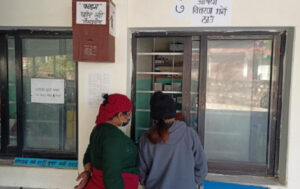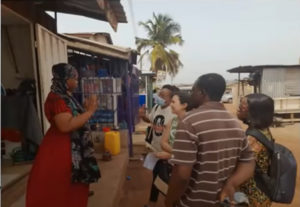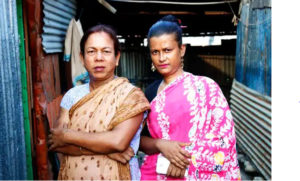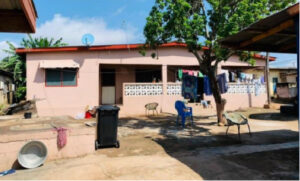
Blog: Gender Norms and Health-Seeking Behaviour in Nepal, Bangladesh, Ghana and Nigeria
By Delali Kumapley, CHORUS Research Uptake Co-Lead, and the CHORUS Gender & Intersectionality Group
Based on the case study: “The Influence of Changing Gender and Social Norms on Health Seeking Behaviour and Health Systems in Cities” by Sushama Kanan, Abriti Arjyal, Lauren Wallace, Ada Nwameme, Chinyere Mbachu, Faria Islam, Samina Huque, Umme Salma, Grishu Shrestha, Helen Elsey.
Health-seeking behaviour and gender norms are changing across cities. Though the context of various cities may vary, our research shows that in all CHORUS cities, there are differences in health-seeking between men, women and transgender people and these gendered differences are fundamentally shaped by differences due to wealth, education, age, disability, race, religion and caste.
These early findings were gathered from the needs assessment that formed the initial phase of the first projects under CHORUS in Bangladesh, Nepal, Nigeria and Ghana where data was gathered qualitatively using individual interviews and participatory transect walks with different genders, local stakeholders and health providers in urban poor neighbourhoods in the four countries.
The findings were presented at the 18th International Conference on Urban Health in Valencia, Spain in October 2022 in a panel session on “How are Changing Gender and Social Norms influencing Health Systems in Cities in West Africa and South Asia?” by Dr. Lauren J. Wallace, University of Ghana; Sushama Kanan, ARK Foundation, Bangladesh; Dr. Chinyere Mbachu, Health Policy Research Group, University of Nigeria; and Abriti Arjyal, HERD International, Nepal.
CHORUS research teams used the gender analysis framework developed by Morgan R. et al. 2016[i] to tease out the main themes from the CHORUS needs assessment findings using questions such as – Who has what? Who does what? How are values defined? And how can change happen? The framework and approach to intersectional and gender analysis are available in our guidelines here.
Issues that emerged from the presentations largely related to primary care access, particularly, for men and other vulnerable groups. Remarkably, there are several similarities in the preliminary findings from the needs assessment across the four countries and this blog explores some of them.
Gender Roles – Who does what?
In all four countries, early findings show that women’s roles are gradually changing. In the past, women were primary caregivers while men were the breadwinners of the family. However, during the needs assessment, it was apparent that women are now playing the multiple roles of earning income, carrying out domestic chores and caring for the family’s health. For example, in Pokhara Metropolitan City, Nepal among the urban poor, women are more involved in caregiving and supporting family members who need to visit a health provider. Likewise, in some slums in Nigeria, women, in addition to being primary caregivers in the household, are also earning income, taking critical healthcare decisions and paying for health care.
Belief Systems and Health-Seeking Behaviour
In Nigeria and Ghana, men and women may use both herbal treatments as well as orthodox medicines, such as those purchased from pharmacies. We found that men (in Nigeria) and both women and men in Ghana, especially Muslims, are more likely to use herbal remedies with the notion that some ailments are amenable to only herbal/traditional treatments and that people respond differently to treatment modalities. While some respond well to traditional herbs, others respond well to orthodox medicines. Similarly in South Asia, traditional healers are still relevant in many urban slums in Nepal and Bangladesh.
In Ghana, religion, ethnicity, and language play a role in how health workers are perceived in communities. Urban poor communities can be highly political places where people are perceived as either ‘outsiders’ or ‘insiders’ and this may affect how they receive Primary Healthcare services such as the Community Health Planning Services (CHPS) programme. In urban settings in Accra, health workers such as nurses who work in the CHPS programme may not be of the same ethnicity as their clients and they are often also not members or residents of the communities where they work. As a result, nurses may have trouble conducting some of their activities such as home visiting without assistance from opinion leaders such as chiefs who are trusted by communities. However, in rural settings where ethnicity tends to be more homogenous, it may be easier for health workers to communicate with and reach clients.
Sources of Primary Care and Health-seeking Behaviour
In some CHORUS countries, both men and women, including vulnerable or marginalized persons (e.g. transgender and sex workers) visit pharmacies or chemical shops rather than public primary care clinics. The reasons for this preference are different across contexts. They include discrimination, the unaffordability of public health centres, the opening times and waiting times at these centres, and the unavailability of certain services. Regarding discrimination, for instance, in Bangladesh, the transgender community cited discrimination at the health centres from both staff and other visiting patients.
One finding quoted a member of the transgender community as saying, “If we ever enter a hospital or clinic, the behaviour of the doctors, nurses and other staff become very uncomfortable. We are often asked in a harsh, unwelcoming tone to wait to say, ‘Why have you come here?’ or ‘Come last of all.’” Thus, transgender patients are resorting to alternative sources of primary care, like pharmacies near the slums where the owners show them empathy.
In terms of the unaffordability of care, a respondent from Nigeria highlighted this fact: “For me, and my family, we do not go to the hospital. Even when my children fall sick, we only buy medicine from the chemist because it is affordable. Unlike the hospital where they tell us to go to the lab and pay for a card before we can see a doctor, the protocol takes someone well enough to wait.”
In Bangladesh and Nepal, most of the respondents prefer going to government facilities to receive health care because they are free of cost. Unfortunately, most residents in the slum communities are daily wage earners and are unable to visit these hospitals because their opening hours coincide with the time they need to work for an income. Both elderly people and daily wage labourers factor in travel time and physical distance between their homes to health facilities and make alternative choices for seeking primary health care. In Ghana, men and women both complained about the long waiting times for care at public health centres and hospitals, which often encouraged them to visit pharmacies and chemical shops, especially for minor ailments.
A lot of men, particularly in the slums in Ghana, are engaged in manufacturing, carpentry, artisanal jobs and scrap dealing. Such men are exposed to injuries and wish there were more comprehensive services provided by the Community-based Health Planning Services (CHPS) programme. Currently, the urban CHPS focuses largely on maternal, reproductive and child health care provision, thus many men prefer going to the pharmacies and chemical shops as the first point of care.
Conclusion
Many urban poor residents and those living in urban slums are resorting to the more accessible and affordable community pharmacies and informal providers for healthcare. The insights provided by the intersectional gender analysis in the four countries imply that cities can begin to build health systems that are accessible to and appropriate for everyone irrespective of age and gender. A more inclusive and gendered approach will ensure Primary Health Care is for women, men, the vulnerable and other minority groups in the urban areas.
To read the detailed case study, please click here.
[i] Morgan, R., George, A., Ssali, S., Hawkins, K., Molyneux, S., & Theobald, S. (2016). How to do (or not to do)… gender analysis in health systems research. Health policy and planning, 31(8), 1069-1078.





